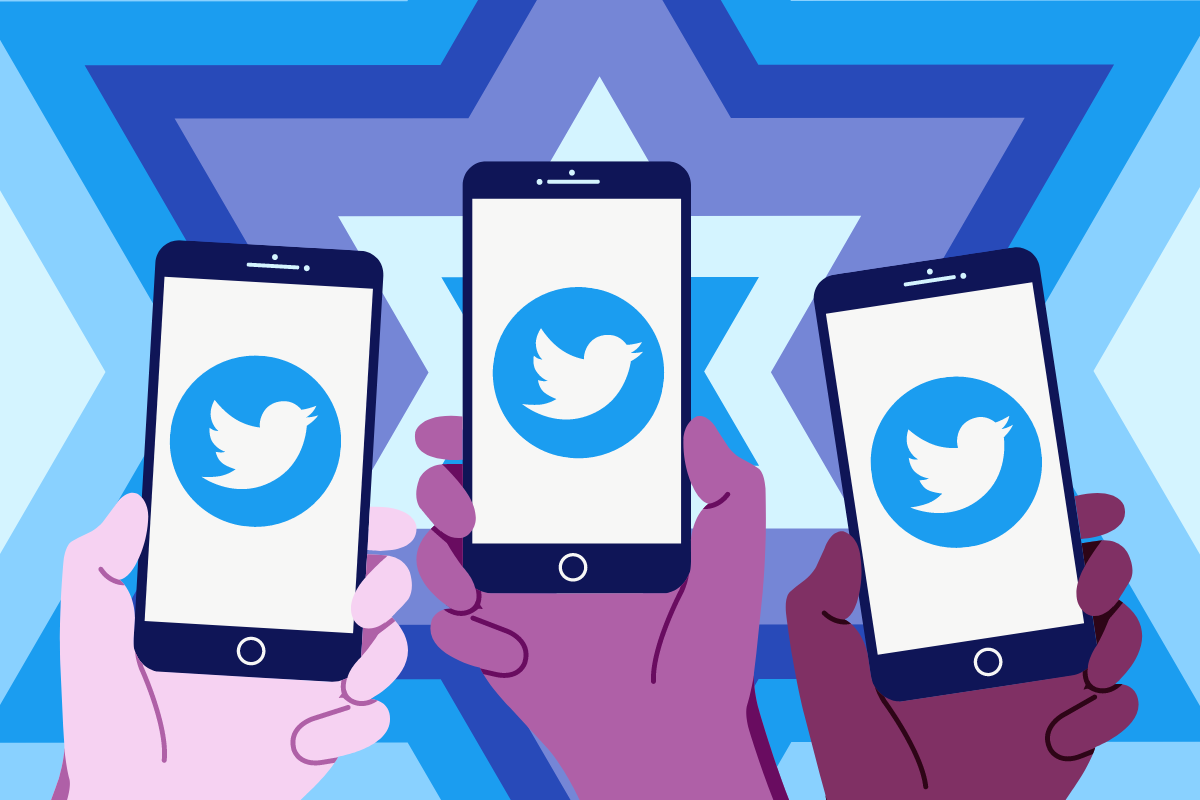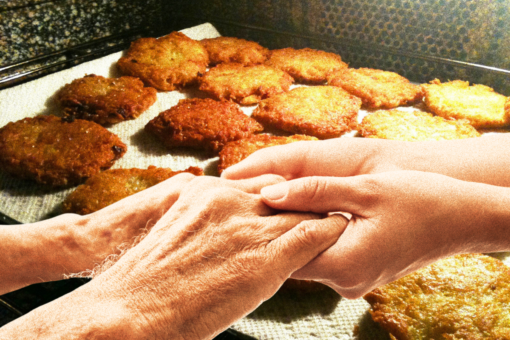As all good things do, it started with memes. I didn’t go seeking them out, they just started coming into my feed: niche Jewish memes that I didn’t quite understand, but which still spoke to something in me. Then, after the memes, there was art. Art made of blessings, art made of lines from stories in the Talmud, art made from Jewish ideas. So, I followed them.
Actually, before the memes, there were the Nazis. Like many Jews, I found myself arguing with literal Nazis on Twitter during the 2016 presidential election and its aftermath. They were emboldened, and it seemed like they were everywhere. Before then, I’d been less prone to get involved. As a Twitter user, I was more a lurker than an active participant. I’d send snarky comments to politicians every now and then, but that was about it. When the Nazi Wave really hit, I couldn’t stay quiet. None of us could.
I’d never been quiet about being Jewish, but I’d never exactly been loud about it, either. I don’t wear any regalia, I don’t attend synagogue – although I flirted with doing so around the time I left high school – and I don’t frequent social gatherings hosted by Jewish organizations. Having said that, I’ve been wearing a chain around my neck covered in pendants that are unmistakably Jewish: a Magen David, a chai, a mezuzah, a hamsa. I never leave the house without wearing it.
My mother raised me with the knowledge of my Jewishness. We observed the High Holidays – although I didn’t start fasting on Yom Kippur until my late teens – and I was bar mitzvahed in Israel, where my grandmother lived until she passed almost a decade ago. That was about the extent of it, though. This is not to denigrate my early Jewish education; we just weren’t a particularly observant family. My grandmother spoke Yiddish but deliberately didn’t teach it to my mother so she could talk about her without her knowing. The only Yiddish I know is from TV shows, books and my three years of study at university, where it was technically one of my majors.
But on Twitter, during those tense years of the Trump presidency, I began connecting with likeminded Jews, rabbis giving sermons on the type of Judaism that matched my politics, my thoughts, my way of interacting with the world, and helped shape the way I did so. Prior to them, my interaction with the Jewish religion was that of a great number of edgy atheist teens; all religion is bad, all structures are bad. I’ll do some stuff because it’s a nice little memorial of my people, or it makes mum happy, but that’s it. My frame of reference for “religion and the world” was almost exclusively Christian. The majority representation of religion and its oppressiveness was stories of people breaking out of Christianity and how “religion” – not just Christianity – broke people and hurt the world. These were paired with extremist Muslims and Hindus, as well as ultra-Orthodox Jews, to prove their point. Religion = bad.
But in interactions with people like Rabbi Danya Ruttenberg, who, among many other things, gave halakhic explanations for why transness was not just acceptable but celebrated in Judaism to her hundreds of thousands of followers, and folks like Elad Nehorai, who spoke out against abuse in yeshivas, trying to create inclusive and good Jewish education and exposing antisemitic tropes and language, and the anonymous person who ran the @JustSayXian account, who fought bigots left and right with what seemed like an encyclopaedic knowledge of Talmud and Jewish history, I found the types of Jews I’d been seeking all along.
After years of interacting with and participating in this community of likeminded Jews, I started bringing more of that Judaism into my daily life: reading more Jewish books and poetry, bringing the Yiddish I’d studied at university into more use for my personal enjoyment, and making and craving Jewish foods, mostly Ashkenazi as those are my roots, but some truly excellent Sephardic and Mizrahi dishes, too. These rituals and holidays mean a lot to me and, even though I do not keep kosher, and I still don’t attend any synagogue, I now consider myself observant in many ways.
Twitter was my synagogue – the JTwitter/Jwitter community was my community – and what kills me now is that it might be taken away.
Since Elon Musk’s recent takeover of the company, instances of hate speech have increased dramatically. Friends I’ve made in my ephemeral temple are leaving Twitter for other platforms – whether they be Instagram or Mastodon or some other heretofore unknown to me social media platform – because they don’t feel safe. The community I’d just found may be breaking apart, driven off by hateful bigots like so many of our ancestors were, perhaps with less bloody violence – although not none, as rising hate speech on social media more than likely led to the shootings at the synagogues in Pittsburgh, Poway and Halle – and the drowning of our mentions and feeds with antisemitic imagery and conspiracy theories. There’s also the real threat of Twitter going bankrupt because of Musk’s meddling.
I don’t want to give it up, though. This is my community and I want to fight for it, push back against the tide of bad actors and bigoted, screaming schmucks. Where I live, there are only something like 156 Jews and the only Jewish organization is a Chabad, which I personally don’t feel comfortable in. While a good number of my friends are Jewish – a drastic change from my high school days as one of only three in my grade – we don’t often have the capability of discussing Big Jewish Ideas in the same way I like to with the community I’ve found for myself on Twitter.
Although the stakes feel lower because it’s all online and “Twitter isn’t the real world,” this still feels like a real battle against a rising tide of antisemitism, racism and hate that is bubbling over online because of free speech absolutists like Musk. Being bombarded with hate on the daily has real-world effects and the people doing the bombarding will feel freer to share these ideas in their offline lives. We need to fight that.
How? For a start, call it out where you see it. Don’t be silent anywhere anymore. Foster connections in not just our own community, but other minority communities. We’re not the only ones going through this; if we band together, we can push back against a rising tide of bigotry. We need to make being a bigot in society an untenable social position — and that goes for in person and, yes, on social media.



